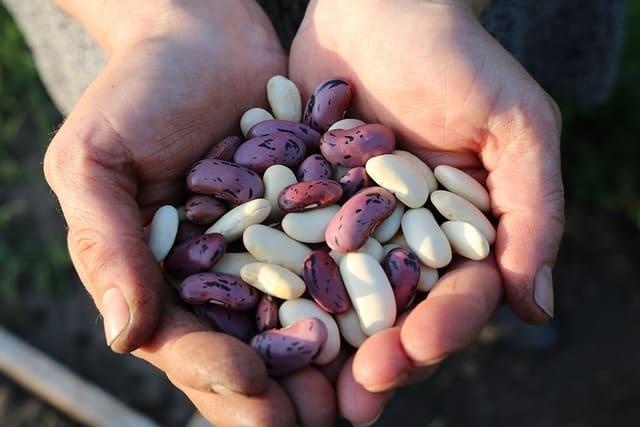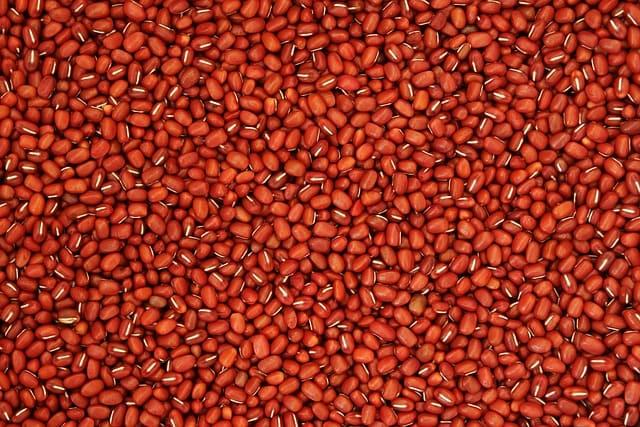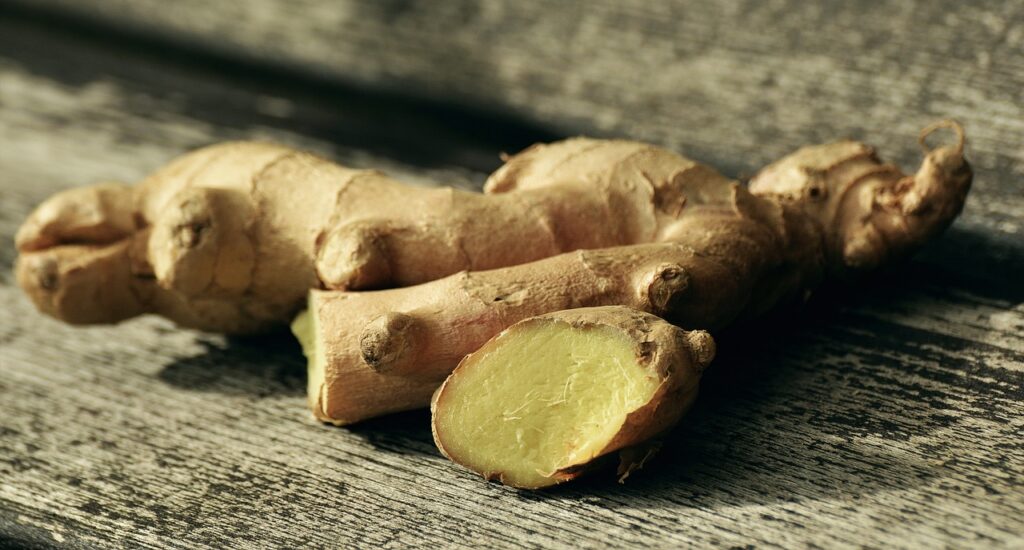Beans: a nutritional powerhouse! Packed with fiber, protein, and antioxidants, they support heart health and overall well-being.
Beans, encompassing a diverse array such as kidney beans, black beans, and chickpeas, stand out as nutritional powerhouses, offering a myriad of health benefits that contribute to overall well-being. Packed with protein, fiber, vitamins, and minerals, beans play a pivotal role in supporting muscle development, promoting digestive health, and regulating blood sugar levels. The high fiber content aids in weight management by inducing a feeling of fullness, while also fostering a healthy gut microbiome. Additionally, beans are rich in antioxidants, combating oxidative stress and inflammation, thereby reducing the risk of chronic diseases. Their low glycemic index makes them an excellent choice for individuals managing diabetes, as they help stabilize blood sugar levels. Furthermore, beans boast an environmentally friendly profile, as they contribute to soil health by fixing nitrogen and requiring less water compared to some protein sources. Embracing the benefits of beans not only enhances nutritional intake but also fosters sustainable dietary practices, making them an essential component of a balanced and health-conscious diet.
In this article, we will explore the nutritional content and the diverse array of benefits associated with incorporating beans into your diet.
Rich Source of Plant-Based Protein:
Beans emerge as a rich source of plant-based protein, making them an invaluable component of vegetarian and vegan diets. Protein is an essential macronutrient vital for the body’s growth, repair, and overall functionality. What distinguishes beans in this regard is their impressive protein content, providing a substantial alternative to animal-based sources. For example, one cup of cooked black beans contains about 15 grams of protein, catering to a significant portion of the recommended daily intake. This protein is not only abundant but also highly bioavailable, meaning the body can efficiently absorb and utilize it.
Incorporating beans into one’s diet brings forth numerous benefits associated with plant-based protein consumption. Firstly, beans contribute to muscle development and maintenance, making them an ideal choice for individuals engaged in physical activity or looking to enhance their protein intake without relying on meat. Additionally, the protein in beans comes bundled with a variety of essential nutrients, such as fiber, vitamins, and minerals, further augmenting their nutritional value. The fiber content not only aids in digestion but also promotes a prolonged feeling of fullness, assisting in weight management and preventing overeating. Beyond individual health, embracing beans as a plant-based protein source contributes to a more sustainable and environmentally conscious food system, as cultivating legumes generally requires fewer resources compared to livestock farming. Thus, the rich protein profile of beans not only supports personal health goals but also aligns with broader considerations of ecological sustainability in dietary choices.
High in Fiber:
Beans, renowned for their exceptional nutritional profile, notably stand out for being high in fiber, a crucial component for promoting digestive health and overall well-being. The soluble and insoluble fiber found in beans offers a range of benefits, including aiding in regular bowel movements, preventing constipation, and supporting a healthy gut microbiome. The soluble fiber in beans helps regulate blood sugar levels by slowing down the absorption of glucose, making them an excellent choice for individuals managing diabetes. Furthermore, the fiber content contributes to weight management by promoting a feeling of fullness, reducing overall calorie intake, and supporting weight loss efforts. Embracing beans as a dietary staple not only provides a delicious and versatile addition to meals but also ensures a substantial intake of fiber, fostering a robust foundation for digestive and metabolic health.
Complex Carbohydrates for Sustained Energy:
Beans emerge as a powerhouse of complex carbohydrates, offering a sustained and reliable source of energy. Unlike simple carbohydrates found in processed foods, the complex carbohydrates in beans are digested slowly, leading to a gradual release of glucose into the bloodstream. This slow digestion and absorption contribute to a steady and prolonged release of energy, making beans an ideal choice for maintaining consistent blood sugar levels. The complex carbohydrates in beans also provide a sustained feeling of fullness, helping to control appetite and curb unnecessary snacking, which is particularly beneficial for those aiming to manage their weight.
Moreover, the complex carbohydrates in beans play a vital role in supporting physical endurance and cognitive function. As the body breaks down these carbohydrates, glucose becomes readily available as a primary energy source for muscles and the brain. This makes beans an excellent choice for athletes, individuals engaged in physical activities, and those seeking sustained mental focus throughout the day. Additionally, the steady release of energy from complex carbohydrates helps prevent the energy crashes associated with consuming simple sugars, providing a stable and enduring fuel source for daily activities. In summary, by incorporating beans into the diet, individuals can enjoy the advantages of sustained energy levels, improved satiety, and enhanced endurance, all attributed to the complex carbohydrates uniquely present in these nutritious legumes.
Abundance of Essential Nutrients:
Beans boast an abundance of essential nutrients, making them a nutritional powerhouse with significant health benefits. These legumes are rich in plant-based protein, offering a valuable alternative to animal sources. For instance, a cup of cooked black beans contains approximately 15 grams of protein, contributing substantially to the daily protein requirements. Additionally, beans are an excellent source of dietary fiber, with a serving providing a significant portion of the recommended daily intake. This fiber content plays a crucial role in digestive health, promoting regular bowel movements, preventing constipation, and supporting a diverse and healthy gut microbiome. Moreover, the soluble fiber in beans has been associated with improved cholesterol levels and better blood sugar control, making them particularly beneficial for individuals managing cardiovascular health and diabetes.
Beyond protein and fiber, beans are a rich source of various essential vitamins and minerals, including folate, iron, magnesium, and potassium. Folate is crucial for DNA synthesis and cell division, making it particularly important during pregnancy for fetal development. Iron is essential for oxygen transport in the blood and preventing iron-deficiency anemia, while magnesium and potassium contribute to proper muscle function, nerve signaling, and maintaining a healthy blood pressure. The nutritional profile of beans not only supports individual health but also aligns with dietary guidelines promoting the consumption of nutrient-dense foods for overall well-being. For those looking to optimize their nutrient intake, incorporating a variety of beans into their diet provides a diverse array of essential nutrients, contributing to a well-rounded and balanced nutritional profile.
References:
United States Department of Agriculture (USDA). (2021). FoodData Central. Retrieved from https://fdc.nal.usda.gov/
Micha, R., Peñalvo, J. L., Cudhea, F., Imamura, F., Rehm, C. D., & Mozaffarian, D. (2017). Association Between Dietary Factors and Mortality From Heart Disease, Stroke, and Type 2 Diabetes: A Systematic Review and Meta-analysis of Prospective Cohort Studies. JAMA, 317(9), 912–924. https://doi.org/10.1001/jama.2017.0947
Heart Health Promotion:
Beans contribute significantly to the promotion of heart health, offering a range of nutrients and properties that have been associated with cardiovascular well-being. Firstly, the high fiber content in beans plays a crucial role in lowering cholesterol levels. Soluble fiber, particularly abundant in beans, binds to cholesterol in the digestive tract, preventing its absorption and facilitating its elimination from the body. This mechanism has been linked to a reduction in low-density lipoprotein (LDL) cholesterol, often referred to as “bad” cholesterol. By incorporating beans into the diet, individuals can actively manage their cholesterol levels, mitigating the risk of atherosclerosis and cardiovascular diseases.
Moreover, beans contain a variety of heart-protective compounds, including antioxidants, potassium, and magnesium. Antioxidants combat oxidative stress and inflammation, both of which contribute to the development of cardiovascular diseases. Potassium helps regulate blood pressure by counteracting the effects of sodium and promoting vasodilation, while magnesium supports proper muscle function, including the heart muscle. A case study conducted by the American Heart Association revealed that a higher intake of legumes, including beans, was associated with a lower risk of coronary heart disease. The study demonstrated that individuals who consumed legumes at least four times a week had a 22% lower risk of coronary heart disease compared to those who consumed them less than once a week. This compelling evidence emphasizes the significant role beans can play in the prevention of heart-related ailments, making them a valuable dietary component for cardiovascular health.
Weight Management and Satiety:
Beans play a pivotal and multifaceted role in the realm of weight management and satiety, making them a valuable component of a balanced and healthy diet. Central to their impact is the high fiber content present in beans. This dietary fiber, both soluble and insoluble, serves as a crucial factor in weight management by imparting a sense of fullness or satiety. The soluble fiber forms a gel-like substance in the digestive tract, slowing down the absorption of nutrients and promoting a gradual release of energy. This results in sustained feelings of fullness, which can be instrumental in curbing excessive caloric intake and promoting weight loss or maintenance.
Moreover, beans contribute to satiety through their complex carbohydrate composition. The slow digestion of these carbohydrates provides a sustained and steady release of glucose into the bloodstream, preventing rapid spikes and subsequent crashes in blood sugar levels. This steady energy release helps in regulating appetite and reducing cravings, making it easier for individuals to adhere to a controlled and healthy eating pattern. Beyond their impact on weight management, beans play a vital role in blood sugar control, which is particularly beneficial for individuals looking to manage or prevent conditions such as diabetes.
Blood Sugar Regulation:
Beans provide significant benefits in the realm of blood sugar regulation, primarily owing to their low glycemic index and rich fiber content. The complex carbohydrates in beans are digested slowly, resulting in a gradual release of glucose into the bloodstream. This slow digestion helps prevent rapid spikes in blood sugar levels, offering a steady and sustained source of energy. Furthermore, the soluble fiber in beans forms a gel-like substance during digestion, slowing down the absorption of glucose. This dual mechanism of slow carbohydrate digestion and soluble fiber content contributes to improved insulin sensitivity and better blood sugar control. Incorporating beans into the diet can be particularly advantageous for individuals with diabetes or those at risk of developing the condition, as it supports a more stable and regulated blood glucose profile, reducing the likelihood of sudden fluctuations that can have adverse health effects.
Conclusion:
In conclusion, the numerous benefits of beans underscore their exceptional nutritional value and positive impact on overall health. With a rich combination of dietary fiber, slow-digesting carbohydrates, protein, and a range of essential nutrients, beans play a multifaceted role in promoting well-being. The high fiber content contributes to improved digestive health, weight management, and enhanced feelings of satiety. Beans, with their low glycemic index, are particularly advantageous for blood sugar regulation, making them a valuable addition to the diets of individuals managing diabetes or aiming to prevent its onset. Additionally, the versatility of beans in various culinary applications makes them an accessible and delicious option for incorporating into a balanced diet. Whether supporting cardiovascular health, aiding in weight loss, or providing a plant-based protein source, the benefits of beans make them a staple in fostering a healthy and sustainable lifestyle.
Remember, beans are a versatile, affordable, and incredibly nutritious food. Embrace their benefits and unlock a world of culinary possibilities!
FAQs about Bean Benefits:
Q: Are beans really good for me?
A: Absolutely! They’re packed with protein, fiber, vitamins, minerals, and antioxidants, making them a nutritious and affordable addition to any diet.
Q: What makes beans so healthy?
A: Their high fiber content promotes gut health, digestion, and keeps you feeling full longer. They’re also low in fat and cholesterol, while being rich in essential nutrients like folate, iron, and potassium.
Q: What are the different types of beans?
A: There are many! Popular choices include black beans, kidney beans, pinto beans, chickpeas, lentils, and more. Each variety offers slightly different nutrient profiles and culinary uses.
Q: Don’t beans make you gassy?
A: Initially, they can for some people. Soak and cook beans properly, introduce them gradually, and consider consuming digestive enzymes to minimize gas production.
Q: Can beans replace meat?
A: They can be a great vegetarian/vegan protein source. Their iron and zinc content might not be as readily absorbed as from animal sources, but pairing them with vitamin C-rich foods can increase absorption.
Q: How can I incorporate beans into my diet?
A: The possibilities are endless! Add them to salads, soups, stews, chilis, dips, wraps, burgers, and even desserts. Experiment with different spices and flavors to keep things interesting.
Q: Are there any quick and easy bean recipes?
A: Sure! Canned beans are your friend! Whip up a bean salad with chopped vegetables and herbs, toss them into pasta dishes, or make a quick black bean burger for lunch.
Q: Is it okay to eat beans every day?
A: Yes! Moderation is key, but enjoying a serving of beans most days is a great way to boost your diet’s nutritional value and reap their health benefits.
Q: Where can I find more information about beans?
A: The National Bean Bureau, American Heart Association, and registered dietitians are excellent resources for recipes, nutritional information, and cooking tips.
Also Read : Best Foods In The World






